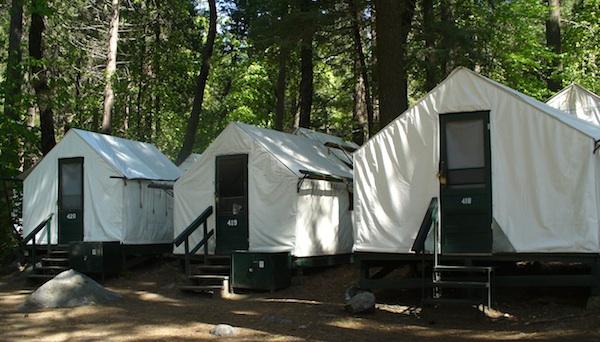
Accommodations in Curry Village will change with the next concessions contract/David and Kay Scott
The recently issued prospectus for operation of the majority of Yosemite National Park's concession facilities includes several significant changes related to the park's lodging. Lodging, a major revenue generator for the winning bidder (and the National Park Service), is expected to generate from $52-$57 million in 2016, the year the new lease kicks in. This is approximately twice the amount the concessionaire is expected to generate in food and beverage sales during the same year. Retail sales generate approximately the same revenue as food and beverage. The new contract will be for 15 years with a beginning date of March 1, 2016.
The most significant lodging change is to occur at Curry Village, where the Park Service is planning to replace 52 canvas tents with cabins that include bathrooms. This will reduce the number of tent cabins at Curry to 351 and increase the number of cabins with bathrooms to 98. Curry also has 14 cabins without bathrooms and 18 motel-type rooms.
The prospectus also calls for removing 34 tent cabins (these are duplex units, meaning 17 structures would be removed) at Housekeeping Camp, leaving 232 of these units. In the High Sierra Camps, half the 22 tents at Merced Lake and four beds at Glen Aulin are to be removed.
The prospectus includes an especially stiff franchise fee of 8.6 percent of the concessionaire's annual gross revenues. Assuming the new cabins at Curry Village are completed on schedule before the end of the contract's seventh year, the franchise fee will increase by an additional six-tenths of 1 percent, resulting in a fee of over 9 percent. This compares with NPS fees of 4 percent at Mesa Verde and Sequoia/Kings Canyon national parks, 6 percent at Mount Rainier National Park, and 1 percent at Glacier Bay National Park.
In addition to a 9.2 percent franchise fee, the concessionaire is to pay an annual 2 percent repair-and-maintenance fee. Adding the California sales tax of 7.5 percent, a Mariposa County sales tax of .5 percent, a Mariposa County Transient Occupancy Tax of 10 percent, and a Mariposa County Tourism Business Improvement District Assessment of 1 percent, results in a guest at Yosemite Lodge paying $240 for a room (the price listed on the DNC site for an October stay), $27 of which represents NPS fees, plus another $45 in various sales taxes. Thus, a family staying in Yosemite Lodge will be paying over $70 a night in fees and taxes. An Ahwahnee stay would entail well over $100 per night in fees and taxes.
While the park's main concession facilities are in Yosemite Valley, the prospectus also covers concession operations at Badger Pass, Crane Flat, Glacier Point, Tuolumne Meadows, Wawona, White Wolf, and the High Sierra Camps. According to the NPS prospectus, each location ''¦. presents unique opportunities and challenges'¦.'



Comments
Obviously that didn't dimminish your visit.
Nope, but if one of those lake-view rooms at the Many Glacier Hotel had been more reasonably priced, I'd have given it a lot more consideration :-)
According to whom? Obviously since the hotel sells out on a regular basis, someone thinks the prices are reasonable.
In this land of great economic inequality, one might venture that a lot of folks feel they're unreasonable.
But, of course, the issue really is supply and demand, and without creating more lodging in the Yosemite Valley, the pricing will continue to creep upwards and place an overnight stay out of reach for more and more.
It has to be a tough issue for the Park Service to deal with in light of concerns that the parks are losing relevancy with Americans.
There are many interesting and valid points in this discussion. And the diversity of opinion shows why Yosemite has always been an emotional topic. I am a camper. To me nothing is better than being in nature. We all have different reasons for going and we choose how to experience Yosemite. My concern is that access to the national park is being limited by the refusal of NPS to restore the flood damaged campsites. I am not poor, nor that affluent to rent lodging in the valley For many young families with small children, camping is the only way. High end lodging will always be there for those who can afford it. But we must insure family auto based drive in camping doesn't become just another number to drop to the bottom line. Yosemite belongs to ALL the people, and affordable access must be preserved.
In this land, even if you are at the bottom of the ladder you are far richer than most the rest of the world. A family of 4 with income of $15,000 is in the top 25% of the world's earners. Income inequality is a meaningless measure on its own. I would much rather make $15,000 and have my boss make 15 million than make $5,000 and have my boss make $50,000.
This land is a land of great economic opportunity. If you want to stay in a fancy hotel in the park, go out and earn the money to do just that. Instead, too many are sitting back and waiting for their handouts which is exactly why inequality has increased under the current administration.
http://www.huffingtonpost.com/2012/04/11/income-inequality-obama-bush_n_...
Well, now you're going down an entirely different rabbit hole, one that would take this thread in an entirely different direction. Google "income inequality" and you'll come up with 13 million results in two-thirds of a second.
Reasons/beliefs vary tremendously, some related to education levels and some to whom you marry, and rather than take this thread elsewhere by getting down in the weeds about them, I'll leave it at that.
I am with you on that Kurt, but you are the one that brought it up. I will say no more on the subject - of course unless someone else does and needs to be corrected.